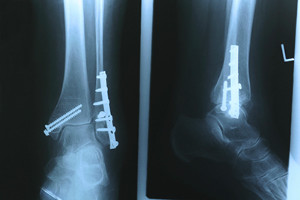Understanding the Basics of Stress Fractures
Monday, 18 May 2020 00:00 Stress fractures primarily occur when the feet are overused. As foot muscles get tired, they are unable to absorb as much shock from impact, and the stress is transferred to the bone. Over half of all stress fractures occur in the lower leg, and athletes involved in activities such as basketball, running, and gymnastics are at a higher risk for trauma. Since stress fractures can be difficult to diagnose through an X-Ray, communicating the risk of stress fractures to doctors is key, because they may have to resort to CT scans or MRIs. If diagnosed with a stress factor, rest is key. However, a podiatrist may be able to recommend shoe inserts or braces to help as well. For the best treatment methods, please consult with your local podiatrist.
Stress fractures primarily occur when the feet are overused. As foot muscles get tired, they are unable to absorb as much shock from impact, and the stress is transferred to the bone. Over half of all stress fractures occur in the lower leg, and athletes involved in activities such as basketball, running, and gymnastics are at a higher risk for trauma. Since stress fractures can be difficult to diagnose through an X-Ray, communicating the risk of stress fractures to doctors is key, because they may have to resort to CT scans or MRIs. If diagnosed with a stress factor, rest is key. However, a podiatrist may be able to recommend shoe inserts or braces to help as well. For the best treatment methods, please consult with your local podiatrist.
Activities where too much pressure is put on the feet can cause stress fractures. To learn more, contact one of our podiatrists from Bazzi Podiatry. Our doctors can provide the care you need to keep your pain free and on your feet.
Dealing with Stress Fractures of the Foot and Ankle
Stress fractures occur in the foot and ankle when muscles in these areas weaken from too much or too little use. The feet and ankles then lose support when walking or running from the impact of the ground. Since there is no protection, the bones receive the full impact of each step. Stress on the feet can cause cracks to form in the bones, thus creating stress fractures.
What Are Stress Fractures?
Stress fractures occur frequently in individuals whose daily activities cause great impact on the feet and ankles. Stress factors are most common among:
- Runners
- People affected with Osteoporosis
- Tennis or basketball players
- Gymnasts
- High impact workouts
Symptoms
Pain from the fractures occur in the area of the fractures and can be constant or intermittent. It will often cause sharp or dull pain with swelling and tenderness. Engaging in any kind of activity which involves high impact will aggravate pain.
If you have any questions please feel free to contact one of our offices located in Detroit, West Detroit, Northwest Detroit, Sterling Heights, Hamtramck, Dearborn Heights, Madison Heights, Redford, and Livonia, MI . We offer the newest diagnostic and treatment technologies for all your foot and ankle needs.




